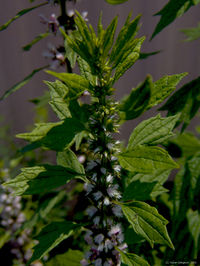Leonurus cardiaca
| See Also | Botanical Monographs |
|---|
Motherwort (Leonurus cardiaca) is known as a cardiac tonic and women's health tonic. It helps to regulate the menses, it promotes blood circulation, stimulates the development of new tissues , is a diuretic and helps to reduce swelling. To explore the characteristics, medicinal uses and prescribing considerations of this herb in more detail, check out the references indicated.[1], [2]
Contents
Characteristics
AKA L. sibiricus in East Asia, Chinese Motherwort, yi-mu-cao
- Common Names: Motherwort
- Family: Lamiaceae
- Habitat: Leonurus cardiaca is native to Europe and has be introduced and naturalized in North America.
- Parts Used: Whole plant, but typically the root (45% alcohol)
- Constituents: alkaloids, cardiac glycosides (cardiac tonic activity), volatile oils
- Medicinal Actions: hypotensive, diuretic, antispasmodic, antithyroid, cardiac tonic, nervine,
Uses
Historical Uses:
In traditional chinese medicine Motherwort was used to promote longevity and strengthen the heart.
Medicinal Uses:
- cardiac tonic for cardiac autonomic imbalance (sedative effect similar to Valeriana spp.); palpitations (e.g., with anxiety), reduced coronary perfusion (mitigates spasm of coronary artery)
- amenorrhea from cold, bearing down, or pelvic and lumbar uneasiness or pain; suppressed lochia
- dysmenorrhea, PMS, women's tonic
- used in childbirth, breastfeeding
- Other Conditions
- nervousness, irritability, delirium tremens, typhoid with nervous excitability, nervous debility or unrest (e.g., at menopause)
Prescribing Considerations
The information provided is intended to augment the treatment from a naturopathic doctor or other trained medical professional. Although most herbs are generally safe, it is recommended that you avoid self-prescribing especially when there is an underlying ongoing medical condition, if you are on any prescription medications or if you are pregnant or breastfeeding.
Formulations and Preparation
- Tincture - 60-120 drops (long use required for therapeutic benefit, but his may also be due to insufficient dose used)
- Fluid extract - 30-60 drops
- Decoction - 60-120mL, every 1-3 hours, 2 tsp (2-4g) per cup
Safety
The safety and prescribing considerations for this herb include:[3] [4]
- Generally regarded as safe.
- Side-effects are generally not seen.
- Drug-Herb Interactions rare.
References
- ↑ Boon Heather, Smith Michael (2009) 55 Most Common Medicinal Herbs: The Complete Natural Medicine Guide Second Edition Institute of Naturopathic Education and Research, CCNM Toronto.
- ↑ Godfrey Anthony, Saunders Paul, Barlow Kerry, Gowan Matt (2011) Principles and Practices of Naturopathic Botanical Medicine, Advanced Botanical Medicine. V3 CCNM Press, Toronto.
- ↑ Stargrove Mitchell Bebell, Treasure Jonathan, McKee Dwight L (2008) Herb, Nutrient and Drug Interactions: Clinical Implications and Therapeutic Strategies.
- ↑ Brinker Francis (1997) Herbal Contraindications and Drug Interactions: Plus Herbal Adjuncts With Medicines, 4th Edition Eclectic Medical Publications.
